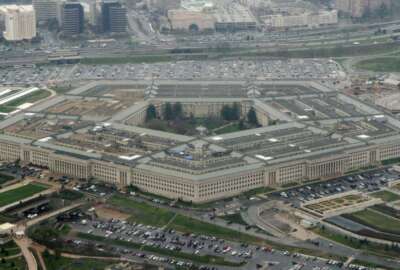The short-lived position of Pentagon chief management officer lasted three years before it was cancelled. Its critics called it wasteful and inefficient. Now, the Senate version of the fiscal 2024 National Defense Authorization Act (NDAA) has a provision reinstating the position, and its supporters say this version provides for a charter that will solve the problems the office had in the past.
After a Congressionally ordered review of the office in 2020, the Defense Business Board (DBB) recommended the position be eliminated. Marine Corps Maj. Gen. Arnold Punaro (Ret.), who co-led the review board, said the language in the Senate bill describes the same position as the one Congress eliminated in 2021.
“I was so shocked when I saw the report that they reinstated the chief management officer — a failed position. Putting it back in isn’t going to make it any more effective than it was before,” Punaro said in an interview with Federal News Network.
Senator Joe Manchin (D-W. Va.) has been promoting bills to bring the position back ever since it was eliminated and said the CMO never had the authority it needed to make the position effective.
“It never had support from the top. If the leaders don’t support it, it’s not going to happen. That’s why they said it was meaningless,” Manchin said during a Senate Armed Services Committee hearing Tuesday.
The position was established in 2018, years after the Government Accountability Office recommended adding the position to Pentagon leadership to conduct audits, reform DoD management and address waste, fraud and abuse. After the position was eliminated in the 2021 NDAA, the management responsibilities were split between several DoD organizations with the DoD comptroller in charge of improving business accountability and performance and the office of Cost Assessment and Program Evaluation (CAPE) taking on planning, programming and analytic processes.
The DBB report concluded that although the CMO was the third highest ranking position in the Pentagon, the office never had enough leverage over DoD officials who act as their own chief operating officers.
“In the basic structure of the management chain of command in the Pentagon, the deputy secretary of Defense is the only one that can make true enterprise level trade-offs, and creating something different than that is not going to solve these knotty problems,” Punaro said.
He pointed to the current system with Deputy Secretary of Defense Kathleen Hicks working as the Pentagon’s chief operating officer as the only effective way to manage the large, unwieldy department.
“You have one strong management lead, and the deputy secretary of Defense — that’s the way the culture of the Pentagon has always worked. That’s the way it’s going work in the future,” Punaro said.
Supporters of reinstating the CMO disagree. A Senate aide with extensive experience working on the issue told Federal News Network it’s too much responsibility for a deputy secretary and comptroller who already have plenty of responsibility.
“There needs to be a specific leader in the department that looks at these cost efficiencies, as well as business practices and then actually pushes them and that would be their primary role. The department is too large, and the deputy secretary and the comptroller already have too large of a plate,” the aide said.
He also said one of the ways a new CMO would be effective is by working with and strengthening the role of CAPE. A group of House Republicans plans to get rid of CAPE, and there is an amendment in the House version of the NDAA to eliminate the office.
“This unsettling trend of getting rid of the [CAPE] office in the House NDAA and placing extremely burdensome reporting requirements on CAPE — that is only going to further limit their very small staff and their ability to do their jobs,” the aide said.
In addition to eliminating CAPE, the House bill makes no mention of reinstating the office of the CMO. In contrast, the Senate bill reinstates the CMO and keeps CAPE, so the outcome for both offices is in question until Congress finalizes the NDAA.
Copyright
© 2024 Federal News Network. All rights reserved. This website is not intended for users located within the European Economic Area.






